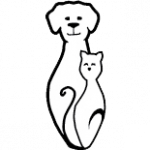Illustrated Articles
-
This handout provides basic guidelines for feeding a pet chinchilla a healthy and balanced diet tailored to the specific needs of chinchillas.
-
Ferrets are carnivores and cannot handle a diet containing more than 4% fiber. A good quality ferret diet should contain 32-40% protein and 10-15% fat. There are several good commercial dry foods for ferrets.
-
The preferred basic diet for guinea pigs is unlimited amounts of Timothy or other low-calcium hay, supplemented with smaller amounts of a commercial, high-fiber, Timothy-hay based guinea pig pellets. The diet should be supplemented with a variety of fresh, well-washed, leafy greens or colored vegetables; especially those high in vitamin C. Guinea pigs cannot manufacture their own vitamin C, therefore it is important that guinea pigs receive a vitamin C tablet or liquid vitamin C directly by mouth every day. Provide fresh clean water in a sipper bottle and check the tube for blockages each day.
-
All pet rodents must be fed a good, high quality rodent chow available at pet stores. Many veterinarians also recommend offering hay and fresh vegetables to rodents to encourage chewing and the wearing down of their continuously growing teeth. Diets containing seeds and nuts are not recommended, as they are high in fat and low in nutrition. You can also feed your rodent fresh, well-cleaned vegetables daily and occasionally give a bit of fruit. Guinea pigs should be fed a commercial high-fiber guinea pig pellet with added vitamin C.
-
Rabbits are herbivores and are considered grazers. Rabbits should have a daily diet of mostly hay, a smaller amount of fresh vegetables, and a limited number of pellets. Hay is the most important part of a rabbit's daily intake. Over-feeding pellets is a common cause of obesity and soft stool. Rabbits must be fed and provided with fresh water daily. Hay should always be available. A pet rabbit's diet should be supplemented with a variety of leafy green vegetables every day. The high sugar content in fruits (and even carrots) may upset the normal GI tract bacteria if given in excess.
-
Ferrets, being strict carnivores, require high animal protein and fat in their daily diets, along with low carbohydrate intake.
-
Dental disease is a common problem in guinea pigs, adn can affect both the incisors and the premolars/molars caoomonly called cheek teeth. Several types of dental problems affect guinea pigs (GPs) and can include incisor and chhek teeth fractures, overgrown teeth, sharp dental spurs, infected tooth roots and dental abcesses. Unlike dogs and cats, GPs do not ahve a problem with tartar accumulation or cavities.
-
Guinea pigs can be hardy and easy to care for when provided an appropriate environment for their unique needs. Like all animals, guinea pigs are susceptible to certain problems and diseases. This handout outlines the diagnosis, treatment, and prognosis for some of the more common health problems of guinea pigs.
-
A pet hedgehog’s diet should mainly consist of high-quality hedgehog food mixed with high-quality, low-fat cat food. The diet may be supplemented with certain insects, fruits, and vegetables, which are listed in this handout. Foods that should be avoided are also listed. Hedgehogs have a propensity for obesity if their food intake is not monitored or controlled.
-
For information purposes, the following article breaksdown Marshall's Premium Ferret Foods for owners.

